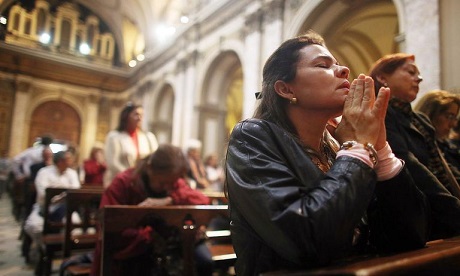Several prominent lay Catholics in France have issued a new manifesto for change in the Church.
Called “Transformer l’Église catholique” (“Changing the Catholic Church”) the 11-member group’s 56-page e-book seeks to answer the question: “What kind of Church would we like to see emerge from the ‘great trial’ we are going through?”
The book’s subtitle says it offers “some proposals collected by Michel Camdessus, a former policymaker at the Vatican”.
Camdessus is well-known as the managing director of the International Monetary Fund from 1987-2000.
In 2000 John Paul II made him one of only a handful of laypersons who were a full member of the Pontifical Council for Justice and Peace.
Camdessus remained in that role until 2017 when Pope Francis replaced the pontifical council with the new Dicastery for Promoting Integral Human Development.
In 2018 Francis’s Letter to the People of God invited all Catholics to “change the Catholic Church”. The new e-book project is Camdessus’s response to that call.
He and the other ten laypersons who contributed to the e-book say it merely offers reflections as “committed Christians”.
The three-chapter work has been bolstered with the assistance of Father Hervè Legrand OP, an internationally renowned ecumenist and ecclesiologist.
Hervè has added a number of historical and theological appendices that strengthen the book’s proposals for ecclesial reform.
The authors say they are deeply concerned about clericalism (including its revival among younger priests) and the persistence of a “narrow” sexual morality many contemporaries ignore.
Furthermore, moves toward advancing synodality and lay participation in Church governance are still too timid, they say.
Although the sexual abuse crisis is what triggered these French Catholics to speak out, their argument – which references to ecclesiastical history and magisterial texts – extends to a widespread plea for changes in ecclesial structures.
The lay Catholics manifesto invites all members of the Church — lay and ordained alike — to face all the related issues head-on.
In the past, these these issues were “widely debated in the media … outside the Church and in a manner that is too rapid”, because they could not be debated inside the Church, the authors say.
But they note discussions on these topics have become more a part of ordinary ecclesial life, especially since the pope issued his Letter to the People of God.
The author’s text invites Christians to commit themselves, by more actively supporting his structural reforms and by supporting Francis’s vision for the future. This commitment may involve collegiality, welcoming the divorced and remarried or helping the official language of the Church to evolve.
They also express frustration, though not in a judgmental way, with Catholics who seem nostalgic for the past. These Catholics are insensitive to societal changes, especially to new family models in particular.
The authors support the Amazon Synod’s proposals, and dream of a Church “entirely nourished by the Gospel and the Eucharist, at the service of the world to come”.
Source
- La Croix
- Image: Learn Religions
